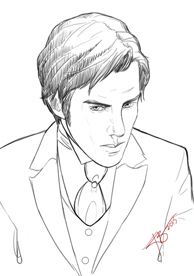Included below is a character analysis about Mr. John Schuyler Moore from the Alienist books. For basic information about John Moore, quotes made by John Moore, or character testimonials about John Moore, please use the menu.
John Schuyler Moore Character Analysis
John Schuyler Moore is the eloquent, yet often befuddled, narrator of The Alienist. He is a crime reporter for The New York Times, and has a thorough understanding of New York City’s underworld and inner workings. John lives with his grandmother in Washington Square during the events of The Alienist however she dies sometime between the events of The Alienist and those of The Angel of Darkness, and in the latter novel, he lives in his own apartment at 34 Gramercy Park. He is a bachelor; he was engaged to a woman named Julia Pratt but, for whatever reason, it was called off. He has also, in a moment of drunkenness, asked Sara Howard to marry him, but her response was, as John describes, “to take me in a cab to the Hudson River and throw me in” (A 41).
Childhood & Upbringing
John Moore was born to a wealthy family in New York City, and as a child was friends with both Laszlo Kreizler and Theodore Roosevelt, as well as later acquainted with Sara Howard. Very little is known of his parents: we know nothing of his mother besides that he had one, and know only of his father that he ran “a moderately sized investment house” (A 139). However, in The Alienist John does briefly discuss his childhood. He claims that both he and his younger brother, instead of playing with other wealthy children, befriended children from the slums of the Gas House district. John describes in The Alienist, 46:
[…] both I and my younger brother had spent our youths ensuring that anarchy reigned as much as possible on the streets of our Gramercy Park neighbourhood. “Ringleaders” was a label my brother and I were usually given by our parents’ friends, and there was much talk about the remarkable misfortune of one family being afflicted with two black sheep.
John does not specify any reason for this behaviour, but it seems his relationship with his parents might not have been an altogether good one: as an adult, they have broken all ties with him. We do know that when Moore was nearly not accepted into Harvard because of his delinquent behaviour, his father gave the University a large sum of money to allow him to attend. However, it is difficult to know whether this was an act of generosity or one of keeping up appearances. Certainly John’s adult behaviour, which will be later discussed, as well as the fact that his brother grew up to become an alcoholic and morphine addict who eventually fell off a boat and drowned, suggests that there was some sort of unhappiness in their childhood; however, there is too little information to judge.
Character & Personality
It is important to note, before analyzing his character, that there is reason to believe that what we’ve observed of John Moore in the novels thus far has only grazed the surface. There is a contrast in John’s character: on one side, he is quite comical, but on the other, much of his history and behaviour are quite dark. Carr has spent ample time developing John’s comical qualities and next to none developing the darker issues he mentions. This gives us the impression that perhaps our image of John Moore is somewhat distorted, probably because the first novel was narrated by him (he doesn’t seem the type to be given to much self-analysis) and because the second novel was narrated by Stevie who, as a child, saw him mainly as a fun guy who put money on horses for him. That said, it’s quite possible that his character will appear vastly different in a novel narrated by Sara Howard or Laszlo Kreizler, both of whom know him more intimately. In the meantime, however, we have to work with what we have.
One thing that is quite clear in both novels is that Moore is rather slow on the uptake: he is always one step behind everyone else. This constant state of confusion is, for the most part, what makes his character so funny and endearing. Caleb Carr has mentioned that he chose to begin the series with John as the narrator partly because it would help his readers to be introduced to the world by a narrator who is constantly asking questions and who isn’t thinking well above the readers’ heads.
Even so, John is not unintelligent. Usually his confusion is due to the fact that he has very little knowledge of the field the group are dealing with in their investigations. He does, however, have a vast knowledge of the workings of New York City. And although he is not very driven in terms of work — he did not want to go to Harvard and tends to give up easily in the investigations — he appears to be a very good journalist. Furthermore, he has an excellent way with words, and the dry humour with which he usually expresses his confusion is what really makes his constant bewilderment so funny: in The Angel of Darkness, 321, he comments, “Oh, yes, […] Ideal. Don’t bother to explain it to the rest of us though, whatever you do.”
Although John brings a smile to the reader’s face, his life, when looked at closely, does not seem to be a very happy one. Consider the following passage from The Angel of Darkness, 322, in which John responds to Mr. Picton’s suggestion that they go to the casino:
“Silence!” Mr. Moore commanded, holding up a hand and suddenly looking eager and excited. “Everyone upstairs and into your dinner clothes, before there’s any more discussion or Rupert changes his mind! Go, all of you, go!”
The comment is characteristically funny, but it is clear in both The Alienist and The Angel of Darkness that John has a gambling habit, which is not very funny at all. John’s gambling debts appear to be one of the reasons all of his family except his grandmother have cut ties with him. In addition, although it is difficult to say whether or not he is an alcoholic, he certainly drinks a fair bit. Almost all of the relationships he’s had, romantic and otherwise, have failed, and the only two of his family members which he appears to have been somewhat close to, his brother and his grandmother, are both dead. He does not appear to have any close friends: even his friendships with Laszlo, Theodore, and Sara are quite emotionally detached. Because of all of this, there is a real sadness to John’s character that has never been properly addressed in the novels thus far. Hopefully a later novel will be able to bring more light to this aspect of John’s character.
Finally, it is interesting to consider Dr. Kreizler’s unwavering belief in John’s loyalty and abilities. Despite his being somewhat slow on the uptake, John is the first person who Kreizler turns to at the outset of the Beecham case. He constantly defends John’s place in the investigation and mentions that John is not a man to break his word. This suggests that perhaps Kreizler knows something about John that is as of yet unknown to us, something that has gained Kreizler’s faith and respect. But again, all we can do at present is speculate.

